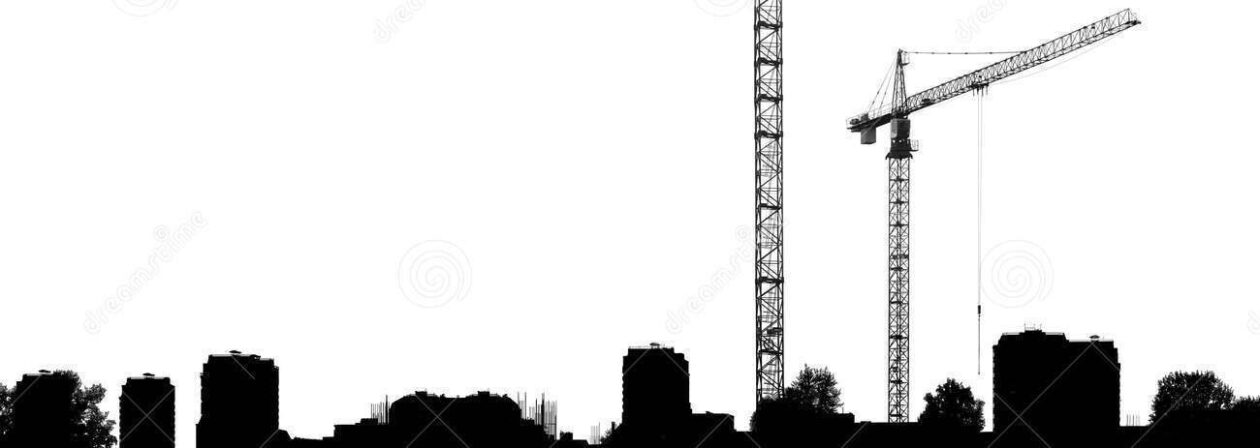Forklift Mast Types: Also referred to as an ‘Upright’, the mast is the vertical assembly on the front of the forklift that does the work of raising, lowering, and tilting the load. Most masts are ‘three-stage’ meaning there are three channels on each side. The channels are similar in appearance to I-Beams.
Attached to the mast is the carriage. Attached to the carriage are the forks. The carriage is actuated by the hydraulic piston in the middle of the mast. Pulling the mast lever on the cowl raises the load by actuating that piston, thus lifting the forks and your load.
All masts lift by hydraulic displacement and lower by the force of gravity. From a simple direct lift to multiple channel staging, each mast type has features that enhance performance or extend the application range of the lift truck.
Free lift is the distance that the carriage will raise prior to the inner channel extending. This feature is imperative for double stacking in a trailer.
Another feature that is an option but is now considered essential to most users is “side shift”. This feature allows horizontal movement of the forks to more precisely pick and place loads in less time.
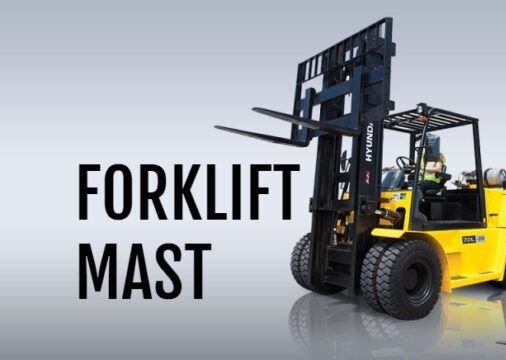
Forklift mast
What type of mast do you need for your forklift?
This may be a question posed to you during your next forklift purchase. Understanding the types of masts available and what each can do is helpful for selection. Below defined the four basic types of uprights and masts: standard, duplex, triple stage, and quad.
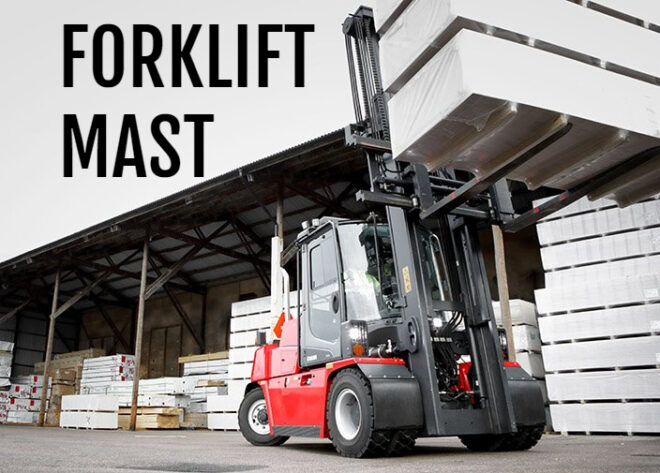
Single-stage mast forklift
Single Stage: The single-stage mast has one channel with a limited lifting height. Free lift (the ability to lift the load and forks without moving the mast channels) is not available.
Due to this limitation, the mast must extend higher than other mast options in order to stack loads. This type of mast is frequently seen in outdoor applications where overhead clearance is not a concern, due to the lack of height clearance restrictions.
standard forklift mast height
The standard upright is a two-stage assembly with two rails, one stationary and one movable inner rail. This upright uses two side-mounted lift cylinders to provide direct lift to the inner rails and indirect chain lift to the carriage/fork assembly. The chain raises the carriage at a rate of two inches for every inch of cylinder rod extension.
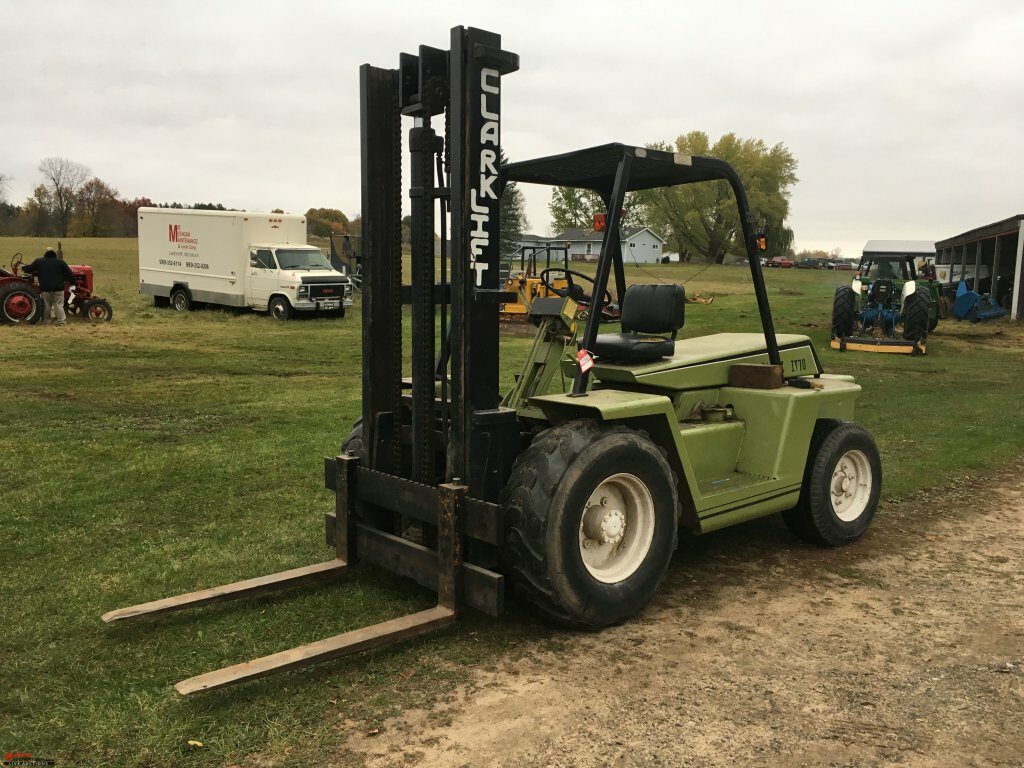
2 stage mast forklift
Two-Stage: The two-stage mast is more common and has a free lift available. These are typically used for stacking and double stacking for indoor applications with limited overhead clearance. They provide excellent visibility and are ideal for use in trailers and boxcars.
Duplex mast forklift
The duplex upright is a two-stage assembly with a full free lift. This upright resembles the standard upright and works in the same way, except a primary, center-mounted cylinder provides full free lift.
The primary cylinder also raises the carriage at a 2-to-1 ratio but raises the carriage to the top of the inner rails before the hydraulic fluid is rerouted to the side-mounted secondary cylinders for direct rail lift.
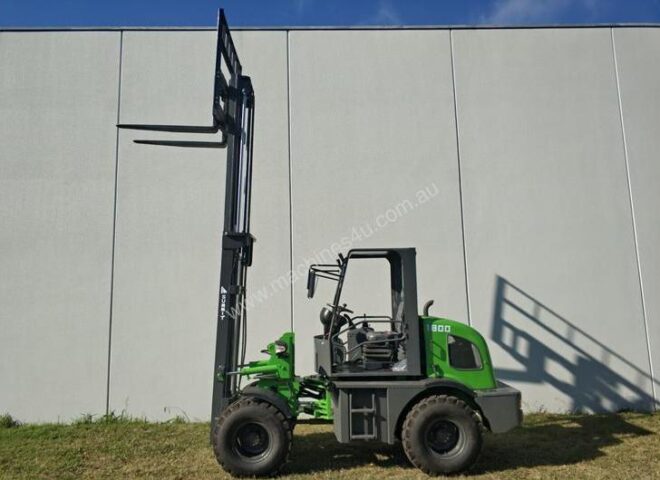
3 stage forklift
Three Stage – The three-stage mast is the most common and versatile forklift mast available. Its free lift and greater heights provided by three stages make for a great lift for stacking in general warehouse applications.
3-stage mast forklift
Triple Stage Upright: The triple-stage upright uses three sets of rails, two movable rails, and one stationary rail for three stage lift with a full free lift. The same principles of operation apply in the triple-stage lift as the hi-lo model but with an extra stage of the lift.
The primary cylinder provides the full free lift of the carriage and forks. The secondary lift cylinders are attached to the intermediate rails. When these cylinders begin to lift, they lift the intermediate rails directly while the chains pull the inner set of rails along with the carriage/fork assembly.
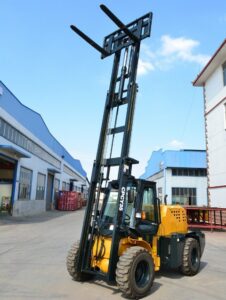
4 stage mast forklift
A four-stage mast provides the highest reach thanks to its four sets of moving rails. These are designed for very high stacking in specialized warehousing and other industries.
Quad mast forklift
The quad upright uses four sets of rails and an added set of chains to provide four stages of lift with a full free lift. Quad uprights work basically in the same way as triple-stage uprights except in that the second set of chains and pulleys operated by the secondary lift cylinders provide the fourth stage of the lift.
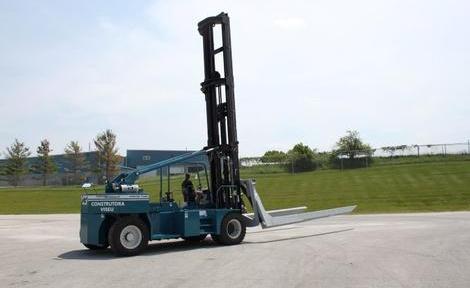
Forklift lifting capacity
The lifting capacity of the forklift decreases as its load is raised
Many people may wonder why some of these differences matter. One would think the only important aspect of a forklift mast is how high it can lift. However, the lowered height is sometimes just as crucial as the maximum lift height. If your application requires you to take a load through a door or your facility has any overhead restrictions, the down height is very important.
Can you make it through all your doors? One step further, can you make it through your doors with your load raised 6″? a full free lift can make that difference when loading and unloading trucks on a dock, in a container, etc…
Keep in mind your capacity as well. Forklifts have a certain base capacity. Take a 5,000 lb. cushion forklift with a triple mast and a side-shift attachment. While the forklift was built to handle a capacity of 5,000 lbs., that was before the triple stage mast and side-shift.
Those features (and others, i.e. extended tilt) can “de-rate” your forklift so your maximum capacity is raised all the way to 188″ and tilted all the way forward while using your side-shift, which could be as low as 2,500 lbs.
Straight mast forklift
Straight mast forklifts are the upright vertical assembly on the front of the machine, raising and lowering the load. All forklifts of this nature work through hydraulic displacement for lifting, and gravity for lowering, but there are different mast types with various benefits.
- Single-Stage Mast forklifts
- Two-Stage Mast forklifts
- Three Stage Mast forklifts
How many mast types are there?
Understanding the types of masts available and what each can do is helpful for selection. Below defined the four basic types of uprights and masts: standard, duplex, triple stage, and quad.
A simplex mast is a single-stage mast with a single channel. The mast and carriage ride simultaneously. It is built in different sizes to meet various lift heights.
A duplex mast has two carriages, or stages, whereas a triplex mast has three carriages or stages. Triplex masts are generally more sought after as the inclusion of an additional carriage ensures maximum lift height that condenses down into minimal closed height.
3-Stage – A three-stage mast, or triplex, is the most versatile forklift mast and also the most popular. The outer rails allow for free lift, and the two inner sections can lift loads higher than a two-stage.
A quad or four-stage mast is designed for very high stacking. Quad masts allow for a shorter collapsed height when compared to a three-stage with equivalent MFH (maximum fork height).
‘Free Lift’ refers to a forklift truck’s ability to lift its forks without raising the masters. This is particularly useful when operating within tight height restrictions.
Straight mast forklifts are the upright vertical assembly on the front of the machine, raising and lowering the load.
The most read
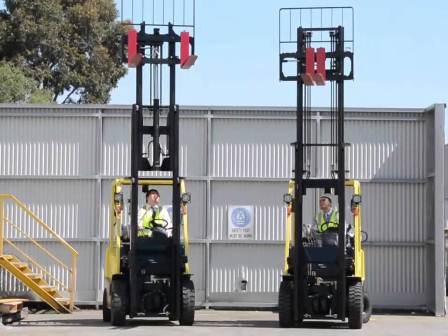
3 Stage Mast Forklift
A three-stage mast consisting of an outer mast, a middle mast, and an inner mast, each mast slidably and nestable engaging an adjacent mast and configured for a positive and negative lift along the length of each mast.
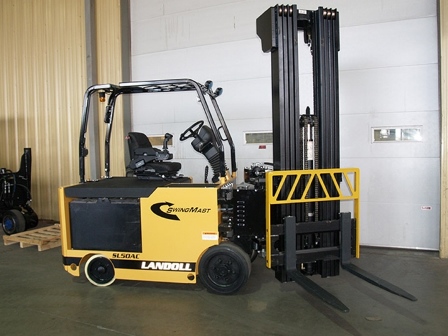
Swing Mast Forklift
Articulated & swing mast forklifts can help you get the most out of your warehouse storage space, but there are other ways to optimize your warehouse design to ensure optimal efficiency.
